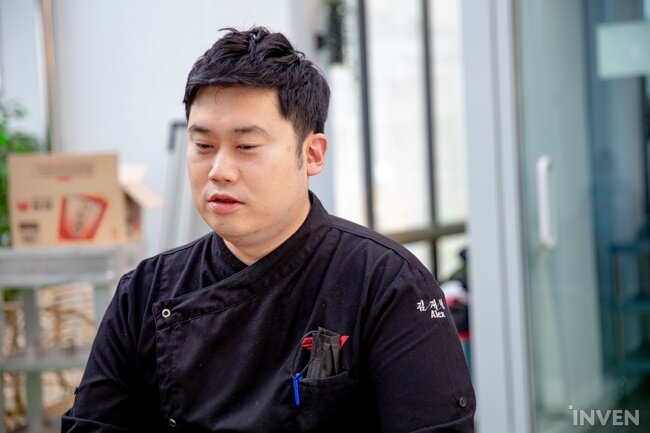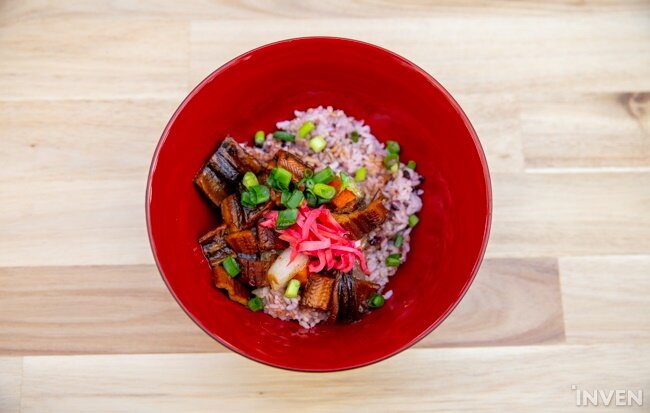
On the ninth floor of T1’s new team building, there is the cafeteria, where head chef Kim “Alex” Jae-hyeong works with his colleagues to prepare 90-100 servings per mealtime. For the players, they even cook late-night snacks. The only day off Alex’s crew has is Sunday.
On the day we visited T1’s building, Alex was making pork cutlets. For daily servings of this size, a pre-cooked food would not be unusual, but T1’s kitchen works with fresh ingredients and makes everything from scratch.
“Even if I’m doing something else, the players come to say thank you. Whenever they do, I feel that what I do is worthwhile. I can’t let go of the quality because of that thank you. I try to find the ingredients of the highest quality and send back whatever that underlines the standards. I make the food thinking that my own family eats it,” said Alex, smiling.
Being passionate about the food they make is normal as a chef, but there’s a reason that Alex is one step more invested.

“I’ve been a [T1] fan for a long time. I’ve liked T1 from back in the Starcraft era, watching BoxeR play. I used to work in a franchised restaurant when I had the chance to meet up with an executive member of SKT. He gave me an offer to work in the new T1 building. I couldn’t believe it.”
At first, however, Alex was hesitant. Since T1’s fanbase was so international, he was worried that he might become a burden to the team. Even so, he wanted to be close to the players, to watch them and cheer for them. As Alex’s career had him working in developing new franchise menus, family restaurants, institutional foodservice companies, rehabilitation hospitals, regular restaurants, and so on, it was clear he could never be a hindrance — only an asset.
When Alex finally made up his mind, he contacted two trustworthy colleagues. Now, three chefs are responsible for T1’s 9th-floor cafeteria.
The players’ meals observed by the main chef: Efficiency and meat
Esports players are the embodiments of efficiency. It could be an attribute from gaming. Our assistant team leader is a former Starcraft 2 pro player — he’s always obsessed with making schedules or routing efficient.
Alex explained, “When I watch the players have their meals, I spot two patterns. Those who eat quickly are much more common than the others. Most of the players finish their meals within 5-10 minutes. They don’t even leave leftovers. Since they like food that they could eat really fast, I often make meals that are toppings on rice, like stir-fried spicy pork.”
Alex added that one request players had was that whenever he cooked braised spicy chicken, the chicken should be boneless — for comfort and efficiency’s sake.
“When I cook fish, I mostly use boneless ones or ones that were picked out. It’s a bother for me to pick out fish bones as well.”

Chef Alex picked Lee “Faker” Sang-hyeok as one of the players out of the norm. “Faker always has more time. He eats slowly. Most of the time, he takes about 30 minutes in the cafeteria for his meal. The other players, even if they are slow eaters, they’d still be faster than the average person, but Faker is unequaled in eating too.”
The side dishes players enjoyed were always ones with meat. “Galbijjim (braised beef short ribs) was the most memorable, and they really like bulgogi too,” said Alex, “I once made them vongole and they really liked it too. I’m thankful to the players that they’re not picky eaters and never complain about the food.”
“One of the reasons that I use a lot of meat is that they like it, but more than that: it’s because being a pro gamer is a job that has to get through tight schedules — they need a lot of stamina,” Alex added. “But I try to get them to eat more greens too, since I’m worried about balanced nutrition. Health is one of the main priorities for the players.”
Rules of T1’s cafeteria: Searching and no pre-cooking

Many fans were surprised by T1’s menus when they were first revealed, because they were always a feast. It was the assumption that the budget for the meals was quite significant, but while Alex wouldn’t go into specifics, he said it wasn’t that much more than that of other cafeterias.
So how is such opulence possible on-a-budget?
The only reason the team can have such quality food, prepared within means, is searching. The T1 chefs flexibly select the ingredients according to the market price and compose the menus. For example, they make food mainly with lettuce when lettuce is in season. That way, they save money to have special menus like lobsters from time to time.
Chef Alex is fully responsible for creating the menu schedule. He researches and keeps up with the trends by using Instagram and other internet media. He says that he raises the satisfaction level by going through Korean, Chinese, and Japanese food evenly. “I always ask the players what they want to have when I pass them by and try to reflect their preferences on the meny,” added Alex.
Another law Alex abides by: no pre-cooking.
“If we pre-cook, there would be food left over and if the food gets cold, it doesn’t taste as good. We try to divide and provide the food when they want it. We don’t even cut the ingredients in advance. If we do, the ingredients could get watery and it gets less tasty. One of the chefs always checks how many ingredients we have left and how many players visited the cafeteria. That way, we could keep up with the speed.”
“Another advantage of sequential cooking is that the amount of food waste is very low. That way, we could save for high-quality ingredients and special menus,” explained Alex.
Even with all his hard work, Alex was sad that he couldn't fulfill everyone’s preferences. “I want to know all the players’ likes and dislikes and serve them only what they like. We always have two main menus, but it’s still difficult to suit everyone’s taste. I think with more time, this process could become more efficient.”
A thank you note

“We have a T1 meals Instagram account. The chefs take pictures of the cooking process and results and the employees add players’ comments on them. I feel proud and it’s always interesting that it’s another great attraction. Fans answer immediately after seeing what kind of food we prepared. Thank you for cheering(?) for us.”
“Our main schedule is from 10 a.m. to 7 p.m. [KST]. Those who are in charge of late-night-snacks come to work at 3 p.m. and get off at midnight. Sometimes it’s tiring, but the work conditions and environment here are really pleasant. When we’re taking a break, we can rest on the rooftop. We’ll keep doing our best.”
“Lastly, I’d like to tell other gaming team chefs that they’re doing a great job. I think we have our own style here in T1’s cafeteria. I’m curious about other team cafeterias’ concepts. If there’s a chance, I’d like to interact with them. Maybe we could form a community and share recipes.”
![]()
- Youngbo "Roxyy" Sim
- Email : roxyy@inven.co.kr
![]()
- David "Viion" Jang
- Email : viion@inven.co.kr
-





Sort by:
Comments :0